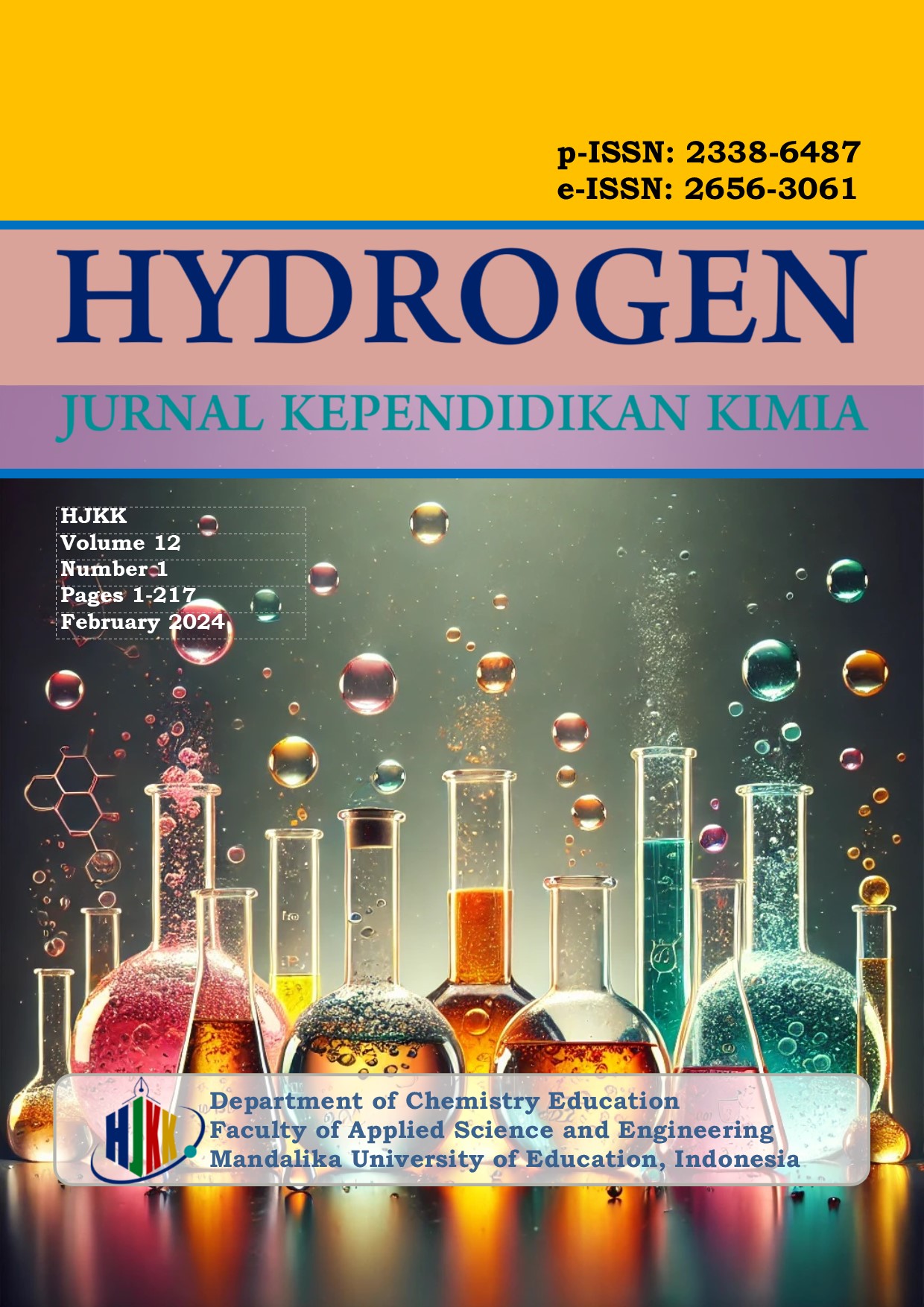Chemsitry Learning Outcomes of 11th Grade Science Students at SMAN 1 Rasau Jaya
DOI:
https://doi.org/10.33394/hjkk.v12i1.10440Keywords:
learning outcomes, chemistry, 11th gradeAbstract
This study discusses the ineffective chemistry learning process resulting in poor grades at State Senior High School (SMAN) 1 Rasau Jaya, students tend to receive information from the teacher without constructing their own knowledge, so students have difficulty in constructing the material obtained from the teacher. The purpose of this study is to describe the learning outcomes of students in 11th Grade Science Class odd semester in chemistry subjects at SMAN 1 Rasau Jaya. The form of research used in this research is descriptive research, and the type of research is a case study. Case study is one of qualitative research, in which researchers conduct in-depth exploration of programs, events, processes, activities, for one or more people. The subjects of this study were students of 11th Grade Science Class at SMAN 1 Rasau Jaya in the 2019/2020 school year who took the odd semester general test, totaling 93 students. The research process includes three stages, namely the preparation stage, the implementation stage, and the final stage. The data collection tool used is the odd semester general test score. Results and Discussion regarding Indicator 1: List the general formula of alkane, alkene and alkyne compounds, Indicator 2: Mention the law of conservation of energy, Indicator 3: Determine the number of moles from the results of the experiment, Indicator 4: Determine the value of the equilibrium constant Kc based on the reaction. The results of the general test conducted on 11th Grade students of SMAN 1 Rasau Jaya can be concluded that the learning outcomes of students in the class are not adequate.
References
Ahmad, Efendi. (2012). Efektivitas Penggunaan Metode Discovery Learning terhadap Hasil Belajar. Skripsi.Yogyakarta: Fakultas Sains dan Teknologi UIN Sunan Kalijaga Yogyakarta.
Anderson, L.W dan Krathwohl, D.R. (2010). Kerangka Landasan untuk Pembelajaran, Pengajaran dan Asesmen (Revisi Taksonomi Pendidikan Bloom). Yogyakarta: Pustaka Pelajar.
Arikunto, Suharsimi. (2006). Prosedur Penelitian Suatu Pendekatan Praktik Edisi Revisi VI. Jakarta: Rineka Cipta.
Arikunto, Suharsimi. (2010). Prosedur Penelitian Suatu Pendekatan Praktik. Jakarta: Rineka Cipta.
Effendy. (2002). A-Level Chemistry For Senior High School Student Volume 1A. Malang: Bayumedia Publishing.
Hamalik, Oemar. (2008). Perencanaan Pengajaran Berdasarkan Pendekatan Sistem. Jakarta: Bumi Aksara
Hamalik, Oemar. (2011). Proses Belajar Mengajar. Jakarta: Bumi Aksara
Huddle, P. W. (2000). Using A Teaching Models to Correct Known Misconception in Electrochemistry. Journal of Chemical Education. Vol.77 (1):104-110.
Margono, S. (2010). Metodologi Penelitian Pendidikan. Jakarta: Rineka Cipta.
Nazir, Moh. (2005). Metode Penelitian. Bogor: Ghalia Indonesia.
Nawawi, Hadari. (2012). Metode Penelitian Bidang Sosial. Pontianak: Gadjah Mada University Press.
Partana, C.F., dan Wiyarsi, A., (2009). Mari Belajar Kimia Untuk Sma-Ma Kelas XI IPA, Penerbit SIC, Jakarta.
Rumansyah dan Yudha Irhasyuarna, (2002). Penerapan Metode Latihan Berstruktur dalam Meningkatkan Pemahaman Siswa terhadap Konsep Persamaan Kimia, Jurnal Pendidikan dan Kebudayaan, No. 035, Tahun Ke-8, Maret 2002.
Sandi, Gede. 2012. Pengaruh Blended Learning Terhadap Hasil Belajar Kimia Ditinjau Dari Kemandirian Siswa. Jurnal Pendidikan dan Pengajaran, Jilid 45, Nomor 3, Oktober 2012.
Sirhan, G. (2007). Learning Difficulties in Chemistry: An Overview. Journal of Turkies Science Education. Vol.4 (2):2-20.
Sudjana, Nana. (2002). Penilaian Hasil Proses Belajar Mengajar. Bandung: PT Remaja Rosdakarya.
Sugiyono. (2013). Metode Penelitian Pendidikan (Pendekatan Kuantitatif, Kualitatif, dan R&D. Bandung: Alfabeta.
Sugiyono. (2015). Metode Penelitian Pendidikan (Pendekatan Kuantitatif, Kualitatif, dan R&D. Bandung: Alfabeta.
Wiyarsi, Antuni dan Crys Fajar Partana. (2007). Penerapan Pembelajaran Berbasis Proyek Pada Perkuliahan Workshop Pendidikan Kimia Untuk Meningkatkan Kemandirian dan Prestasi Belajar Mahasiswa. (Online).
Downloads
Published
How to Cite
Issue
Section
Citation Check
License
License and Publishing Agreement
In submitting the manuscript to the journal, the authors certify that:
- They are authorized by their co-authors to enter into these arrangements.
- The work described has not been formally published before, except in the form of an abstract or as part of a published lecture, review, thesis, or overlay journal.
- That it is not under consideration for publication elsewhere,
- That its publication has been approved by all the author(s) and by the responsible authorities – tacitly or explicitly – of the institutes where the work has been carried out.
- They secure the right to reproduce any material that has already been published or copyrighted elsewhere.
- They agree to the following license and publishing agreement.
Copyright
Authors who publish with Hydrogen: Jurnal Kependidikan Kimia agree to the following terms:
- Authors retain copyright and grant the journal right of first publication with the work simultaneously licensed under a Creative Commons Attribution License (CC BY-SA 4.0) that allows others to share the work with an acknowledgment of the work's authorship and initial publication in this journal.Â
- Authors are able to enter into separate, additional contractual arrangements for the non-exclusive distribution of the journal's published version of the work (e.g., post it to an institutional repository or publish it in a book), with an acknowledgment of its initial publication in this journal.
- Authors are permitted and encouraged to post their work online (e.g., in institutional repositories or on their website) prior to and during the submission process, as it can lead to productive exchanges, as well as earlier and greater citation of published work.
Licensing for Data Publication
Hydrogen: Jurnal Kependidikan Kimia uses a variety of waivers and licenses, that are specifically designed for and appropriate for the treatment of data: Open Data Commons Attribution License, http://www.opendatacommons.org/licenses/by/1.0/ (default) Other data publishing licenses may be allowed as exceptions (subject to approval by the editor on a case-by-case basis) and should be justified with a written statement from the author, which will be published with the article.







